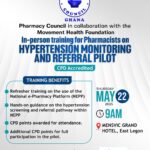It was a sweltering Tuesday afternoon in the year 2015, Madam Adwoa Benewaa, a mother of four recounted her hurrying down the bustling street in Yeji in the Pru East District of the Bono East Region, clutching her handbag tightly which contained a prescription prescribed by a doctor for her son who had been coughing all night.
Her first stop was the small overcrowded pharmacy near the market where other frustrated customers shuffled impatiently in the long queue waiting for their turn but the pharmacist was visibly overwhelmed, darting between shelves stacked with colourful boxes of medicines to serve anxious customers who flooded him with questions.
Madam Benewaa finally reached the counter after nearly 40 minutes of waiting which seemed like ages, only to be greeted with the dreaded words: “We are out of stock.”
Disappointed but undeterred, she moved on to another pharmacy a few streets away. This one was dimly lit and less organised, with medications stored in glass cabinets. The attendant, a young woman chewing gum, seemed indifferent. “No, we don’t have that brand,” she said after glancing at the prescription. “But we have this one,” she added, pulling out a generic version with no explanation of its efficacy or side effects.
She hesitated because she had heard stories of counterfeit drugs being sold in poorly regulated pharmacies. Still, she was desperate because her son’s condition was worsening, and she could not afford to spend the whole day searching for the exact prescription.
By the time Adwoa returned home, exhausted and drenched in sweat, she had spent nearly three hours navigating the traditional pharmacy system for just a single drug.
As she tucked her son into bed that night, she could not help but dream of a simpler system, one where essential medications were just a few clicks away, delivered to her doorstep with a guarantee of quality.
Others like Nana Kwame Asamoah, a 36-year-old resident of Sunyani in the Bono Region also reminisced a familiar routine of travelling to a physical location, spending money on transportation, waiting in long queues to purchase medications at the pharmacy shop and searching for medicine needed desperately for hours or days without finding it.
For him and several other people, whilst these traditional brick-and-mortar pharmacies are essential, they often pose challenges for many people, particularly those in rural areas, people with mobility issues or those in need of essential drugs at critical moments and a more accessible system where people can patronise drugs at the comfort of their homes is long overdue.
E-pharmacy innovation
In an era where global pandemics, like the Coronavirus, the demand for electronic pharmacy services has been strengthened and Ghana is gradually experiencing this growth with the government initiating an online pharmacy, piloted in December 2021 and followed by the launch of the National Electronic Pharmacy Platform, a backbone and interconnectivity platform for the various service providers and pharmacies in July 2022.
Subsequently in 2023, the Pharmacy Council with support from PSGH, FDA, HEFRA, MDC, NMC and Allied Health activated the Ghana National Electronic Pharmacy Platform (GNEPP) to facilitate safe and secure access to medications and pharmaceutical services in Ghana from internet-based applications such as online pharmacies, websites, social media and e-commerce platforms whilst protecting the public.
Ghana’s current pharmacist-to-patient ratio at 1:10,000, which is five times higher than the World Health Organisation’s (WHO’s) 1:2,000, the introduction of the platform is not only transformative but a game changer as it would lessen healthcare provider dependency since subscribers would now be able to access vital health information with the help of a pharmacist, without necessarily going to a pharmacy.
Emphasising the significance of transitioning from traditional methods of dispensing medicine to digital platforms, Dr Amaning Danquah, the Registrar of the Ghana Pharmacy Council, noted that e-pharmacies combine the convenience of online shopping with advanced medical services an innovative approach which is designed to transform how patients access medications and manage their health to enhance overall healthcare delivery.
“There is a paradigm shift globally, so the move to digital space is meant to provide access to prescribed medications for people irrespective of where they are thereby bridging the territorial gap and we are taking advantage of the surge in the digital space to propel this drive in Ghana.”
Dr Amaning Danquah reiterated that the e-pharmacy platform is crucial to ensuring clinical quality, efficiency and safety in the Universal Health Coverage (UHC) oriented medicine benefit schemes because people would have access to the full range of quality health services they need.
According to Dr Amaning Danquah, the purpose of the initiative is to use regulation and technology as a developmental tool to improve access to quality pharmaceutical care, health promotion and disease prevention in line with transparent medicine dispensing mechanisms and promote high accountability and responsibility for such medicines.
“Under the system, only licensed and existing retail pharmacies are permitted to register and operate as electronic pharmacies, in strict compliance with the Electronic Pharmacy Policy. This ensures that e-pharmacies maintain the highest standards of safety, quality, and professionalism in line with regulatory requirements.”
How the platform works
Dr Amaning Daquah explained that this innovative tool enhances patient safety, and makes the lives of everyone much easier when it comes to access to prescribed medications because just in the comfort of your homes, you can surf the platform for pharmacies nearby, submit your request and make a purchase, “To use the platform, one has to register on the e-pharmacy platform with a Ghanacard then a prescription can be uploaded onto the platform via mobile phone through https://www.gnepplatform.com/ (or through a USSD code).”
He continued “The platform enables subscribers to find out which pharmacies are close to them, whether they have the medicines they are looking for and to able to compare prices of medicines across different pharmacies.
Using your mobile phone, you can order the medicine, pay for it, and have it delivered at home, or your location through a digital address.”
Safety concerns and data privacy
While the impact of e-pharmacies is largely positive, there are concerns such as regulatory compliance, data privacy, and potential misuse of medications remain significant concerns but Dr Daniel Amaning Danquah downplayed all these fears stressing that the authenticity of drugs is guaranteed.
“The Pharmacy Council, Ghana is committed to securing in the public interest, the highest standards in the practice of pharmacy by ensuring that pharmaceutical service providers have the right qualification and practice following set standards.
He added, “The authenticity of drugs is also guaranteed because the Ghana National E-pharmacy Platform is integrated with the Food and Drugs Authority (FDA) platform.”
On data privacy, he assured as a way of compliance, before e-pharmacies are granted access to the platform they have to be registered with the Data Protection Agency, in line with the Data Protection Act, 2012, Act 843, after which they would be validated to ensure that citizens can navigate the digital landscape without fearing infringements upon their privacy because the rise in online transactions has led to heightened vulnerability of individuals’ personal information.
“Personal data of individuals is gold in this era so every e-pharmacy has to register with the DPA to ensure compliance because data privacy is a fundamental human right and individuals must have the backing of the Data Protection Law about how their data is being used of protected.”
Public awareness needed
By January 2024, NEPP has onboarded over 200 online pharmacies representing less than 5 percent of the total pharmacies in Ghana, and processed 154,000 prescriptions valued at approximately $1.2 million but transactions constitute less than 1% of the estimated pharmacy sales in the country.
However, significant gains have been achieved as the GNEP Performance Dashboard shows that an impressive 123 hospital pharmacies and 3, 054 community pharmacies have been onboarded as of April 2024 as well as 2,344 active users as of August 2024.
Despite this remarkable achievement, Dr Daniel Amaning Danquah insisted that extensive public education is still necessary to ensure widespread patronage and effective use of the e-pharmacy platform by the general public.
“Educating the public is critical to achieving the full potential of the e-pharmacy system so we must ensure that everyone, understands how to access and benefit from this transformative healthcare solution.”
Inclusivity gap
The inclusivity of e-pharmacy platforms for individuals with disabilities, particularly the visually impaired, is deeply tied to their accessibility features. Tools like screen readers, text-to-speech compatibility, and navigable interfaces are not just add-ons but essential components that ensure all users can access healthcare services independently and with ease.
These features enable visually impaired individuals to browse, select, and order medications without requiring external assistance, reinforcing their autonomy and dignity.
However, Dr Daniel Amaning Danquah admitted that the platforms do not have such features integrated highlighting a glaring gap as this lack of inclusivity represents a significant setback in achieving equitable healthcare access because these barriers contradict the convenience and accessibility for all objectives of e-pharmacies.
“Currently, the platforms lack these accessibility features to support visually impaired users, as a result, any visually impaired individual wishing to use these platforms is compelled to rely on the assistance of someone else who is fully sighted and capable of navigating the system on their behalf.”
To truly bridge this gap, notable e-pharmacy providers like HealthKer and DrugNet must prioritise accessibility features, integrating them into their platforms from the ground up rather than treating them as optional enhancements to make digital-first healthcare truly become a reality.
The future of healthcare in Ghana
Industry players are optimistic that the innovation in improving pharmacy access to the people through e-pharmacy can be a “game changer” in safeguarding the future of the youth and ensuring rational and responsible access to medicines on a scale we have not yet been able to achieve.
Dr Daniel Amaning Danquah stressed that e-pharmacy holds immense potential to transform Ghana’s sector because “With e-pharmacy, concerns about access, the proliferation of fake drugs, reduce disparities in the cost of medicines and tackle some of the major administrative and delivery issues that affect the practice will practically be a thing of the past.”
This report is produced by Frank Addo Aboagye under the DPI Africa Journalism Fellowship Programme of the Media Foundation for West Africa and Co-Develop.



